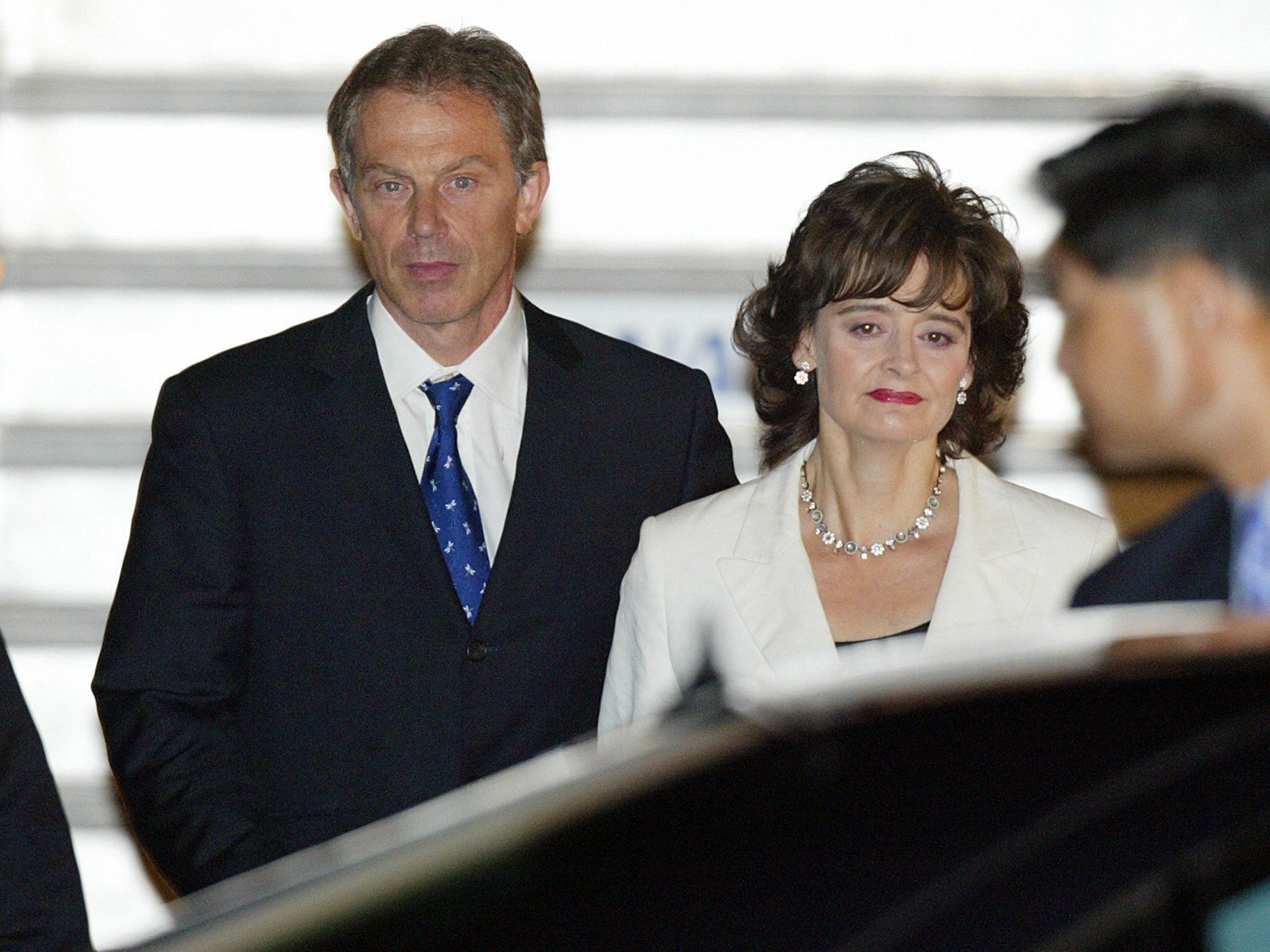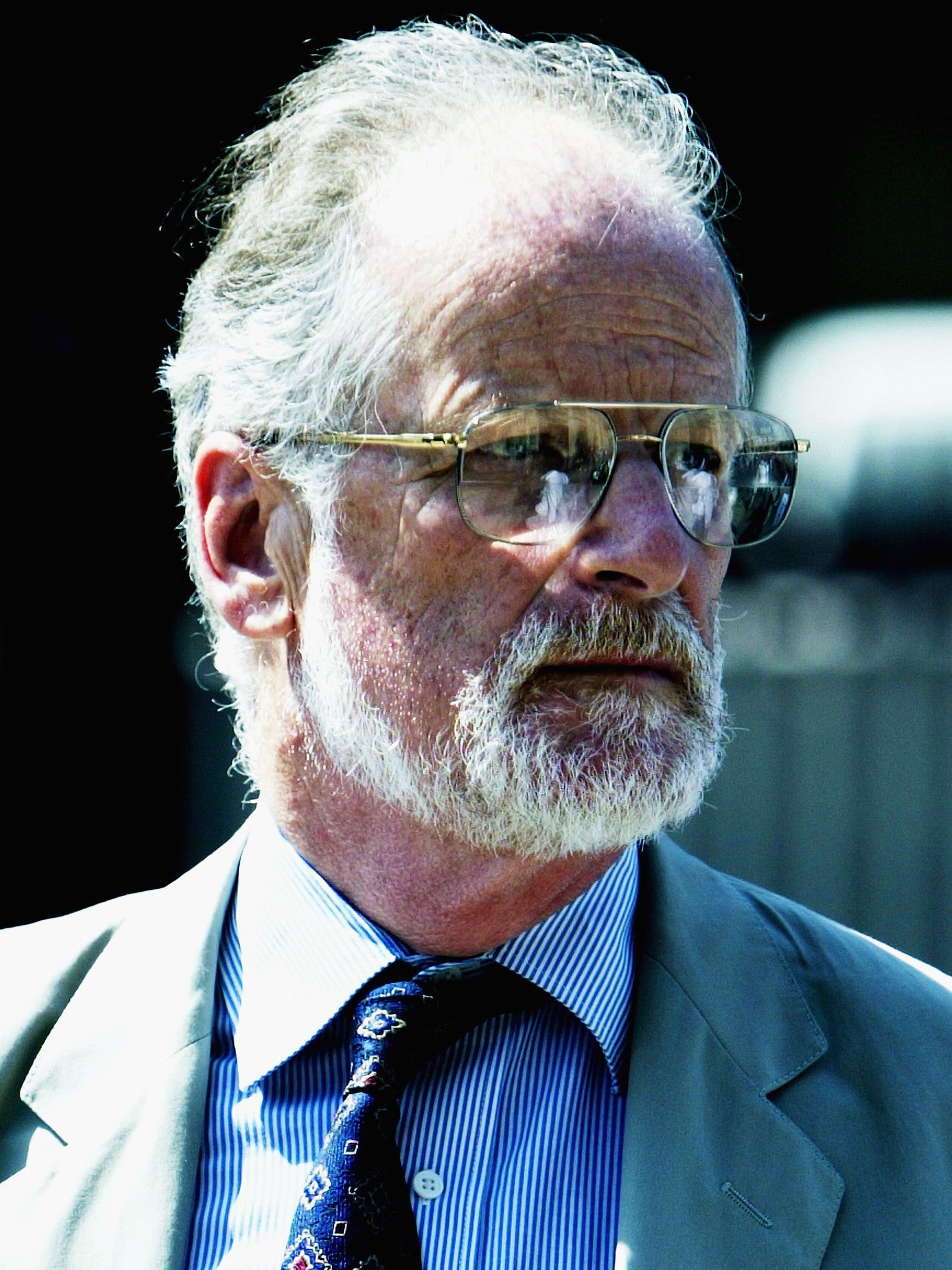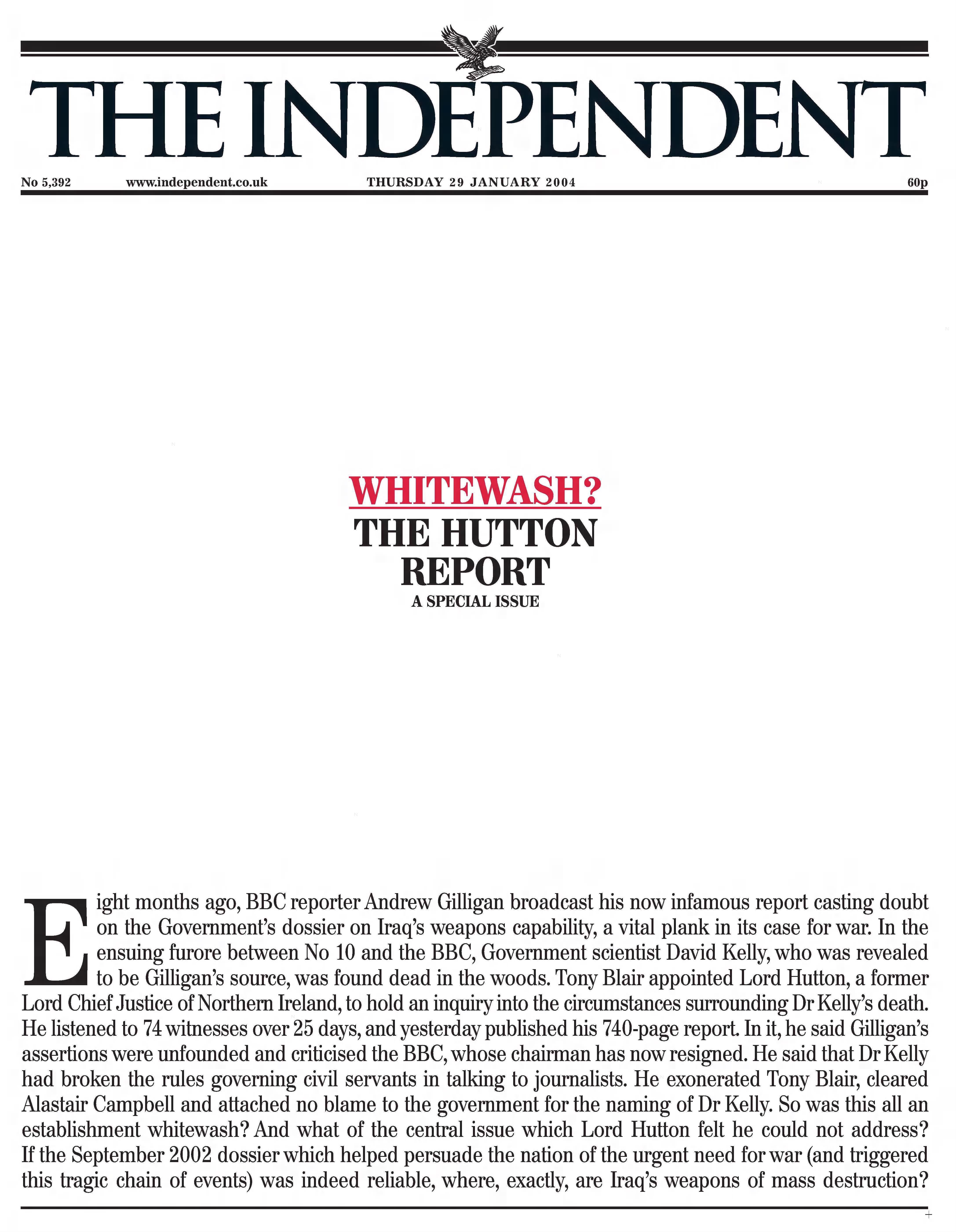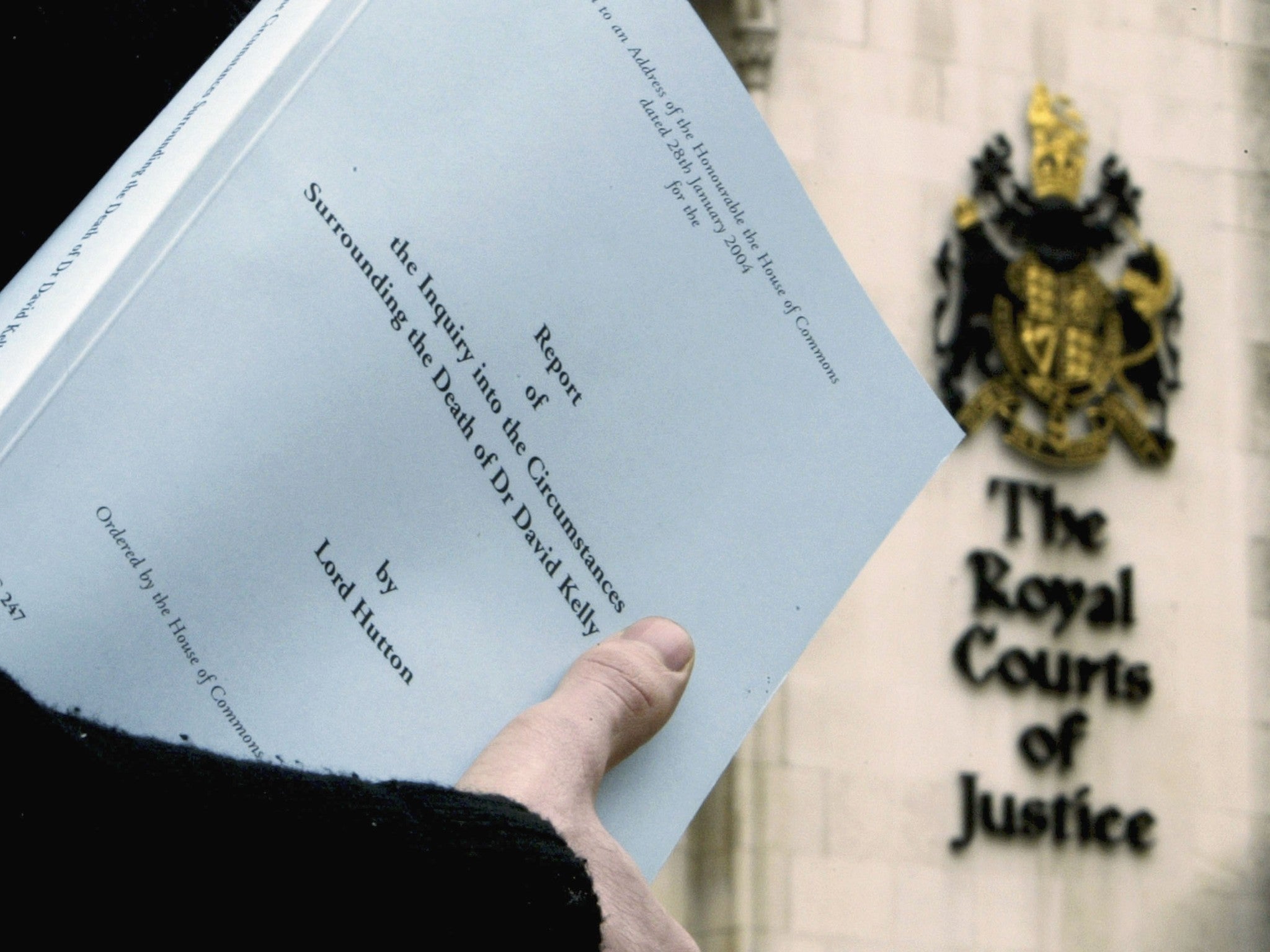
This is the lowest point,” Tony Blair said quietly. It was July 2003. He had just been asked at a press conference in Japan whether there was “blood on your hands” after the apparent suicide of David Kelly, a 59-year-old scientist and leading expert on weapons of mass destruction.
A week earlier, Kelly had been outed by the government as the source of an explosive BBC story, which claimed a Downing Street dossier on Iraq’s WMD had been “sexed up” to justify the US-UK military action against Saddam Hussein’s regime. The dossier alleged the Iraqi military was able to deploy some of its chemical or biological weapons “within 45 minutes of an order to do so”. The charge was potent because no WMD had yet been found, even though Blair was convinced they existed when he based his case for war on them.
Kelly had been hounded after admitting to the Ministry of Defence he had briefed Andrew Gilligan, the BBC journalist whose unscripted remarks down the line from his Greenwich home at 6.07am on Radio 4’s Today programme would provoke a war of words between Number 10 and the BBC, and the biggest crisis in the corporation’s history.
Gilligan said: “What we’ve been told by one of the senior officials involved in charge of drawing up the dossier was that actually, the government probably knew the 45-minute figure was wrong, even before it decided to put it in ... Downing Street, our source says, ordered a week before publication ... it to be sexed up.”

The storm might have abated but three days later, in the Mail on Sunday, Gilligan pointed the finger at Alastair Campbell, the Number 10 director of communications. The BBC stood its ground, even though Kelly was not an intelligence source and had played no part in compiling the dossier. An incensed Campbell ignored Blair’s advice not to “go over the top,” accusing the BBC of “a fundamental attack upon the integrity of the government, the prime minister, the intelligence agencies.” He wrote in his diary that he wanted to “nail Gilligan completely”. Blair and other aides tried to lower the temperature and reach a compromise with the BBC. The process was interrupted when Kelly admitted he had spoken to Gilligan. Campbell’s diary records him saying it would “f*** Gilligan” if Kelly turned out to be his source.
Blair was told about Kelly’s death by suicide on a flight from Washington to Tokyo. It was a dramatic example of the vicissitudes of politics: the prime minister was riding high after a rapturous response to his speech to both houses of the US Congress. Suddenly, Kelly’s death propelled him to the other end of the spectrum. Almost 20 years on, one close ally recalled to me: “He was devastated. He was in a terrible state. I have never known him be so low.”
Blair judged instantly he would have to order an inquiry into the tragedy before one was forced upon him. But who should chair it? Blair claims he wanted someone impartial, impeccable and with no links to New Labour. But close allies now admit privately they wanted an establishment figure who would give the government the benefit of the doubt. They found one in Lord (Brian) Hutton, a law lord and former lord chief justice in Northern Ireland. Peter Mandelson had met him during his spell as Northern Ireland secretary and put his name forward. Lord (Charlie) Falconer, the lord chancellor and Blair’s former flatmate, recommended Hutton to Blair.

From the prime minister’s point of view, Hutton proved an inspired choice. Blair had learned in his time as a lawyer that there were two types of judges: those who made up their minds but left loose ends and something for the defeated party to hang on to, and those who delivered their verdict unadulterated, with every question answered. Hutton was firmly in the latter camp.
His hearings at the Royal Courts of Justice on the Strand, London, saw 74 witnesses give evidence lasting 110 hours across 24 days of a long hot summer. The inquiry shone a searchlight on the inner workings of the government, a rare exercise in transparency that provided a much broader picture than the snapshot of Matt Hancock’s WhatsApp messages because government documents and internal emails were released in full.
Hutton produced a clear-cut verdict beyond the wildest hopes of Team Blair which, in eyes of many of us who attended the inquiry, did not reflect the weight of the evidence he had heard. As The Independent’s political editor the at time, my abiding memory is of sitting in the court and struggling to reconcile the government’s version of how Kelly’s name emerged into the public glare with what I had seen at Westminster as journalists, egged on by Number 10, tried to out him.
I didn’t know then that the naming of Kelly was the issue causing the most anxiety in Downing Street during the inquiry, because Blair, although reluctant to out him, did not stop it happening. He had told journalists: “I did not authorise the leaking of the name of David Kelly.” But the Hutton inquiry heard that Blair did chair the crucial meeting which approved the “naming strategy:" in a cop out, the government would not hand Kelly’s name to the media, but the MoD would not deny it if his name were put to it. A guessing game then ensued, with only one possible outcome. Yet Hutton did not follow this obvious trail, declining to recall Blair to be quizzed for a second time after his involvement was revealed.

His 740-page report in January 2004 largely exonerated the government and he turned his fire on the BBC. He found that Gilligan’s original accusation was “unfounded,” the BBC’s editorial and management processes “defective” and its governors not “diligent”. Rather than being “sexed up”, the dossier was in line with available intelligence, although the Joint Intelligence Committee, chaired by John Scarlett, might have been “subconsciously influenced” by the government.
Hutton concluded that “in the context of the broadcasts in which the ‘sexing-up’ allegation was reported and having regard to the other allegations reported in those broadcasts, I consider that the allegation was unfounded as it would have been understood by those who heard the broadcasts to mean that the dossier had been embellished with intelligence known or believed to be false or unreliable, which was not the case.”
Remarkably, one close Blair adviser involved in handling the crisis admitted to me candidly this week: “The whole thing was a fix from beginning to end. Hutton was well chosen, the inquiry was well managed, well manipulated, well delivered.”
Despite Team Blair’s huge relief at its clear victory, it somehow managed to turn it into a kind of defeat. There was a hostile reaction to the Hutton report by newspapers. The Independent led the way with a memorable front page consisting largely of white space and the word “whitewash”. My report was on an inside page.
Blair sighed that his critics, particularly those opposed to the Iraq war (which included The Independent) were bound to invent a conspiracy and cover-up, no matter what Hutton concluded. As Mandelson put it at the time: “It was as if we won a football match 5-0 but the reporters covering it decided it was a draw and a couple of days later decided we had lost.”

However, Team Blair contributed to that with a series of own goals. During the war of words with the BBC, the prime minister had secretly kept lines open with Gavyn Davies, chair of its governors. They agreed in advance to “keep the temperature down” after Hutton published his report; Blair promised the government would not call for BBC heads to roll if the corporation was criticised. But no one, not even Blair, could hold Campbell back. He held his own news conference, saying heads would have rolled if he or someone under him had been found guilty in the way the BBC had.
Davies viewed this as Blair breaking their understanding and, with a shocked BBC in turmoil, resigned. Greg Dyke, the director general, followed. I revealed in The Independent that the BBC rejected its own lawyers’ advice that Hutton’s findings were flawed. It capitulated, issuing an unreserved apology, to the consternation of many of its staff.
There are parallels between the dispute and the battles engulfing the BBC today. Davies and Dyke had both been Labour donors and Davies’ wife Sue Nye was one of Gordon Brown’s closest aides. This mirrors the links between Richard Sharp, the current BBC chair, and Tim Davie, the director general, and the Conservative Party – although in 2003 a Labour government was at war with natural allies at the top of the BBC. Some of the players are the same. Campbell defended Gary Lineker in the row over his tweet comparing ministers’ language on asylum seekers to that used in 1930s Germany and Dyke criticised the BBC’s handling of the Lineker controversy, his first criticism of its bosses since he resigned after the Hutton report. The BBC backed down after in 2003 (eventually) and has done so again over Lineker.

Twenty years ago, some Labour figures thought Campbell pursued the wrong target by attacking the BBC rather than the real enemy – hostile newspapers. Campbell is unrepentant, saying: “Andrew Gilligan lied about Iraq.” A friend of Campbell told me Labour could not allow the nation’s most influential media outlet to make such false claims because many voters got their political news from “the six and the 10” (pm news bulletins). This clash with the BBC brought Campbell’s time as Blair’s communications director to an end. He was reluctant to go before Hutton reported, but Blair insisted. After nine gruelling years at Blair’s side, a burnt-out Campbell would probably have departed soon in any case.
Others in Blair’s circle regret that Campbell waged war with the BBC, saying his battle kept Iraq, Blair’s integrity and New Labour’s infamous reputation for spin in the headlines for months. One former colleague recalled: “Alastair had every right to be angry, but he was out of control and it turned into a disaster.”
Despite Hutton’s favourable verdict, his report did not bring closure on Iraq as Blair had hoped. Far from it. After the US began to admit that Saddam’s WMD might not exist after all, the prime minister conceded an inquiry into the flawed intelligence by Lord Butler, the former cabinet secretary. There was chaos on the ground in Iraq because there was no plan for the aftermath of the invasion. Although Blair won a third general election victory in 2005, the Iraq war continues to haunt him today.
Gilligan also resigned after the Hutton report. He admitted “a mistake” in the first of 19 two-way interviews he did on that fateful day, by ascribing to Kelly a statement he did not make – the government probably knew the “45-minute” claim was wrong. He watered that down in his later interviews. But Gilligan still insists his “sexed up” claim was not an accusation of lying, merely of exaggerating the WMD threat. He argues that his story was “very substantially correct” and is “very proud” to have done it.

One Blair ally admitted to me: “Gilligan was right in principle but wrong in his details. There was certainly a debate with the spooks about bringing their words about WMD in the dossier into line with the PM’s foreword. As a result, their words were hardened up.”
A civil servant involved in drafting the dossier agreed, telling me: “It was a question of editing the intelligence. Some of the caveats of the intelligence people were taken out.”
Clare Short, who resigned from Blair’s cabinet after the invasion, wrote in her book An Honourable Deception, serialised in The Independent: “I conclude that Gilligan’s story was basically true… The No 10 line after the Butler report was to constantly repeat that Lord Butler was not questioning the prime minister’s good faith. Maybe so, but I am afraid it is clear the prime minister did knowingly mislead, and my own explanation for that is that he must have considered it ‘an honourable deception.’ My conclusion is that Alastair Campbell launched his attack on Gilligan to divert attention from the question of whether the country had been deceived in the rush to war.”
Hutton, who died in 2020, found that Kelly had taken his own life. (His inquiry meant that no inquest was held). Sadly, his report is remembered today for a ferocious battle between the government and the BBC rather than for what it should have been – the tragic death of a highly respected scientist.
As Jeremy Gompertz, the Kelly family’s lawyer, told the inquiry: “His public exposure must have brought about a total loss of self-esteem, a feeling that people had lost trust in him. No wonder Dr Kelly felt betrayed after giving his life to the service of his country …[he] was used as a pawn in their political battle with the BBC.”







